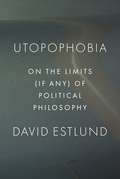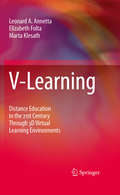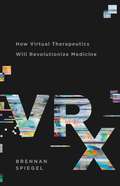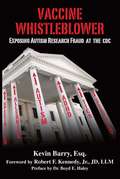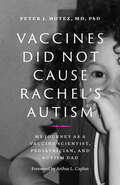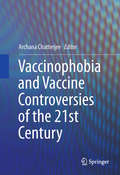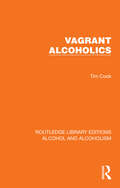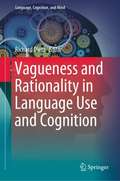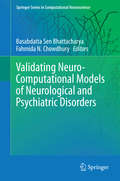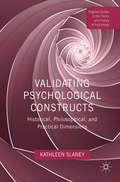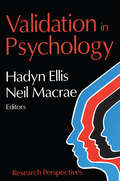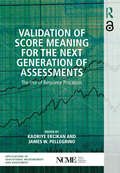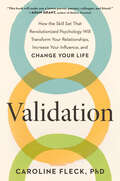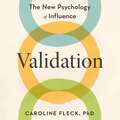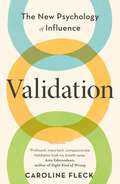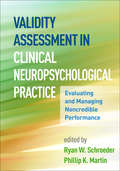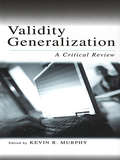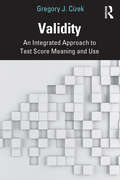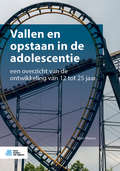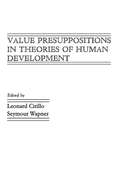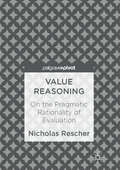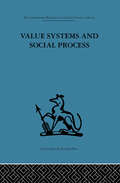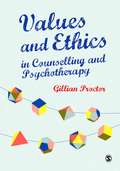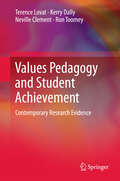- Table View
- List View
Utopophobia: On the Limits (If Any) of Political Philosophy
by David EstlundA leading political theorist’s groundbreaking defense of ideal conceptions of justice in political philosophyThroughout the history of political philosophy and politics, there has been continual debate about the roles of idealism versus realism. For contemporary political philosophy, this debate manifests in notions of ideal theory versus nonideal theory. Nonideal thinkers shift their focus from theorizing about full social justice, asking instead which feasible institutional and political changes would make a society more just. Ideal thinkers, on the other hand, question whether full justice is a standard that any society is likely ever to satisfy. And, if social justice is unrealistic, are attempts to understand it without value or importance, and merely utopian?Utopophobia argues against thinking that justice must be realistic, or that understanding justice is only valuable if it can be realized. David Estlund does not offer a particular theory of justice, nor does he assert that justice is indeed unrealizable—only that it could be, and this possibility upsets common ways of proceeding in political thought. Estlund engages critically with important strands in traditional and contemporary political philosophy that assume a sound theory of justice has the overriding, defining task of contributing practical guidance toward greater social justice. Along the way, he counters several tempting perspectives, including the view that inquiry in political philosophy could have significant value only as a guide to practical political action, and that understanding true justice would necessarily have practical value, at least as an ideal arrangement to be approximated.Demonstrating that unrealistic standards of justice can be both sound and valuable to understand, Utopophobia stands as a trenchant defense of ideal theory in political philosophy.
V-Learning
by Leonard A. Annetta Elizabeth Folta Marta KlesathEqually grounded in the research and the practical applications developed by the authors over a number of years, this book shows how virtual learning environments could represent the future of higher education. As academics begin to use environments such as Second Life to reach a broader student audience, this volume offers the distance-learning community (administrators, faculty, and students) a different, yet successful, approach to delivering content over the Internet through 3D virtual learning environments that have the potential to transform higher education. Covering a broad spectrum of frameworks, from commercial multiplayer video games to online learning, the book shows just how powerful these environments can be in the arena of education, and concludes that data-driven practice will ensure almost universal take-up, even among those currently unwilling to use V-learning. The authors provide numerous practical examples of distance learning in its current state of development, as well as making informed predictions about how future environments might evolve. This much-needed book is right at the cutting edge of its subject, and comes at a time when research in both educational gaming and distance learning are converging.
VISIONS 2100: Stories from Your Future
by John K. O'BrienStories from Your Future The complex issue of climate change is one that our race is struggling to address. The solutions are not beyond us in any way. Technological solutions exist, scientific knowledge is plentiful, the world can afford the transition but still significant action eludes us. Rational arguments for rapid action abound. We do not need any more of those. What is needed is a different way of communicating that inspires and attracts the widest possible group of humans towards wanting to travel on this same journey. As part of the VISIONS 2100 Project, this book tells of the power of Visions and invites the reader to create and share their own vision of a better world. Only by starting conversations of the future will we manage to build the world that we really want. The book balances worries about catastrophe with social and environmental improvements by referencing psychology, management thought, case studies and personal anecdotes. In also references the parallels between the world's journey and coping with the chronic illness of the author's wife. The book is framed around eighty short visions by some of the world's leading environmental thinkers including Mary Robinson, Christiana Figueres, Bill McKibben, Connie Hedegaard, Yvo de Boer and many others. Having a vision of a better world is likely to result in the world being better. 'Poverty is eradicated. Every child goes to school regardless of sex, race, religion or place of birth. Every woman enjoys equality with every man. Every household has access to energy. In 2100, the world is just.' Mary Robinson, Special Envoy on Climate Change, United Nations'Opportunity from 2100 forward is unimaginably vast and incredibly varied.' Christiana Figueres, Executive Secretary, UNFCCC 'Timing is everything, and it hurts to think we blew it.' Bill McKibben, 350.orgThe future is a beautiful, if challenging, partner. Your choice is whether you take the risk in having a first date or whether you are happy to accept a life of regret.www.visions2100.com
VRx: How Virtual Therapeutics Will Revolutionize Medicine
by Brennan SpiegelA leading doctor unveils the groundbreaking potential of virtual medicine.Brennan Spiegel has spent years studying the medical power of the mind, and in VRx he reveals a revolutionary new kind of care: virtual medicine. It offers the possibility of treating illnesses without solely relying on intrusive surgeries or addictive opioids.Virtual medicine works by convincing your body that it's somewhere, or something, it isn't. It's affordable, widely available, and has already proved effective against everything from burn injuries to stroke to PTSD. Spiegel shows how a simple VR headset lets a patient with schizophrenia confront the demon in his head, how dementia patients regain function in a life-size virtual town, and how vivid simulations of patients' experiences are making doctors more empathic.VRx is a revelatory account of the connection between our bodies and ourselves. In an age of overmedication and depersonalized care, it offers no less than a new way to heal.
Vaccine Whistleblower: Exposing Autism Research Fraud at the CDC
by Kevin Barry Robert Kennedy Jr. Dr Boyd HaleyA Firsthand Account from a CDC Insider on the Link between Vaccines and Autism Vaccine Whistleblower is a gripping account of four legally recorded phone conversations between Dr. Brian Hooker, a scientist investigating autism and vaccine research, and Dr. William Thompson, a senior scientist in the vaccine safety division at the Centers for Disease Control and Prevention (CDC). Thompson, who is still employed at the CDC under protection of the federal Whistleblower Protection Act, discloses a pattern of data manipulation, fraud, and corruption at the highest levels of the CDC, the federal agency in charge of protecting the health of Americans. Thompson states, "Senior people just do completely unethical, vile things and no one holds them accountable. ” This book nullifies the government’s claims that "vaccines are safe and effective,” and reveals that the government rigged research to cover up the link between vaccines and autism. Scientific truth and the health of American children have been compromised to protect the vaccine program and the pharmaceutical industry. The financial cost of the CDC’s corruption is staggering. The human cost is incalculable. Vaccine Whistleblower provides context to the implications of Thompson’s revelations and directs the reader to political action.
Vaccines Did Not Cause Rachel's Autism: My Journey as a Vaccine Scientist, Pediatrician, and Autism Dad
by Peter J. HotezInternationally renowned medical scientist, frequent media contributor, and autism dad Dr. Peter J. Hotez explains why vaccines do not cause autism.In 1994, Peter J. Hotez's nineteen-month-old daughter, Rachel, was diagnosed with autism. Dr. Hotez, a pediatrician-scientist who develops vaccines for neglected tropical diseases affecting the world's poorest people, became troubled by the decades-long rise of the influential anti-vaccine community and its inescapable narrative around childhood vaccines and autism. In Vaccines Did Not Cause Rachel's Autism, Hotez draws on his experiences as a pediatrician, vaccine scientist, and father of an autistic child. Outlining the arguments on both sides of the debate, he examines the science that refutes the concerns of the anti-vaccine movement, debunks current conspiracy theories alleging a cover-up by the Centers for Disease Control and Prevention, and critiques the scientific community's failure to effectively communicate the facts about vaccines and autism to the general public, all while sharing his very personal story of raising a now-adult daughter with autism.A uniquely authoritative account, this important book persuasively provides evidence for the genetic basis of autism and illustrates how the neurodevelopmental pathways of autism are under way before birth. Dr. Hotez reminds readers of the many victories of vaccines over disease while warning about the growing dangers of the anti-vaccine movement, especially in the United States and Europe. Now, with the anti-vaccine movement reenergized in our COVID-19 era, this book is especially timely. Vaccines Did Not Cause Rachel's Autism is a must-read for parent groups, child advocates, teachers, health-care providers, government policymakers, health and science policy experts, and anyone caring for a family member or friend with autism."When Peter Hotez—an erudite, highly trained scientist who is a true hero for his work in saving the world's poor and downtrodden—shares his knowledge and clinical insights along with his parental experience, when his beliefs in the value of what he does are put to the test of a life guiding his own child's challenges, then you must pay attention. You should. This book brings to an end the link between autism and vaccination."—from the foreword by Arthur L. Caplan, NYU School of Medicine
Vaccinophobia and Vaccine Controversies of the 21st Century
by Archana ChatterjeeVaccinophobia and Vaccine Controversies of the 21st Century Archana Chatterjee, editor Once hailed as a medical miracle, vaccination has come under attack from multiple fronts, including occasionally from within medicine. And while the rates of adverse reactions remain low, suggestions that vaccines can cause serious illness (and even death) are inspiring parents to refuse routine immunizations for their children--ironically, exposing them and others to potentially serious illness. Vaccinophobia and Vaccine Controversies of the 21st Century explains clearly how this state of affairs came into being, why it persists, and how healthcare professionals can best respond. Current findings review answers to bedrock questions about known adverse events, what vaccine additives are used for, and real and perceived risks involved in immunization. Perspectives representing pediatricians, family practitioners, nurses, parents, pharmacy professionals, the CDC, and the public health community help the reader sort out legitimate from irrational concerns. In-depth analyses discuss the possibility of links with asthma, cancer, Guillain-Barre syndrome, SIDS, and, of course, autism. Included in the coverage: Communicating vaccine risks and benefitsThe vaccine misinformation landscape in family medicinePerceived risks from live viral vaccinesThe media's role in vaccine misinformationAutoimmunity, allergies, asthma, and a relationship to vaccinesVaccines and autism: the controversy that won't go awayThe conundrums described here are pertinent to practitioners in pediatrics, family medicine, primary care, and nursing to help families with informed decision making. In addition, Vaccinophobia and Vaccine Controversies of the 21st Century should be read by trainees and researchers in child development and maternal and child health as the book's issues will have an impact on future generations of children and their families.
Vagrant Alcoholics (Routledge Library Editions: Alcohol and Alcoholism)
by Tim CookIn the 1970s the vagrant alcoholic was not a new problem, and for the previous two hundred years people had asked: What can be done to help them? Why not lock them up? Why don’t they get jobs? Tim Cook had worked for many years with homeless men and in this book, originally published in 1975, he describes the problems of vagrant alcoholics and the way in which one voluntary organization, the Alcoholics Recovery Project, based in South London, responded to these problems. The response had in essence been one of experimentation beginning with the first hostel in 1966, the development of non-residential shop fronts in 1970, and the employment of a team of recovered alcoholics in 1974. The Project sought to break down the mistrust surrounding the problem on all sides and to rediscover the potential of the so-called ‘hopeless’ skid row alcoholic. Tim Cook places the Project’s work in the wider context of social work and social responsibility, and shows that its methods had relevance for other agencies. He also examines the persistent failure of successive governments to take any positive action to tackle the problems of vagrant alcoholics. Throughout the book the views of the alcoholics themselves are integrated with the attitudes and experiences of the Project workers. The author offers an assessment of the Project’s work, and an outline of its limitations, stressing that no easy answer exists to this problem. But, he believed, the Project had made valuable progress towards a greater understanding of the vagrant alcoholic and his milieu.
Vagueness and Rationality in Language Use and Cognition (Language, Cognition, and Mind #5)
by Richard DietzThis volume presents new conceptual and experimental studies which investigate the connection between vagueness and rationality from various systematic directions, such as philosophy, linguistics, cognitive psychology, computing science, and economics. Vagueness in language use and cognition has traditionally been interpreted in epistemic or semantic terms. The standard view of vagueness specifically suggests that considerations of agency or rationality, broadly conceived, can be left out of the equation. Most recently, new literature on vagueness has been released which suggests that the standard view is inadequate and that considerations of rationality should factor into more comprehensive models of vagueness. The methodological approaches presented here are diverse, ranging from philosophical interpretations of rational credence for vagueness to adaptations of choice theory (dynamic choice theory, revealed preference models, social choice theory), probabilistic models of pragmatic reasoning (Bayesian pragmatics), evolutionary game theory, and conceptual space models of categorisation.
Validating Neuro-Computational Models of Neurological and Psychiatric Disorders
by Basabdatta Sen Bhattacharya Fahmida N. ChowdhuryThis book is a collection of articles by leading researchers working at the cutting edge of neuro-computational modelling of neurological and psychiatric disorders. Each article contains model validation techniques used in the context of the specific problem being studied. Validation is essential for neuro-inspired computational models to become useful tools in the understanding and treatment of disease conditions. Currently, the immense diversity in neuro-computational modelling approaches for investigating brain diseases has created the need for a structured and coordinated approach to benchmark and standardise validation methods and techniques in this field of research. This book serves as a step towards a systematic approach to validation of neuro-computational models used for studying brain diseases and should be useful for all neuro-computational modellers.
Validating Psychological Constructs
by Kathleen SlaneyThis book critically examines the historical and philosophical foundations of construct validity theory (CVT), and how these have and continue to inform and constrain the conceptualization of validity and its application in research. CVT has had an immense impact on how researchers in the behavioural sciences conceptualize and approach their subject matter. Yet, there is equivocation regarding the foundations of the CVT framework as well as ambiguities concerning the nature of the "constructs" that are its raison d'etre. The book is organized in terms of three major parts that speak, respectively, to the historical, philosophical, and pragmatic dimensions of CVT. The primary objective is to provide researchers and students with a critical lens through which a deeper understanding may be gained of both the utility and limitations of CVT and the validation practices to which it has given rise.
Validation in Psychology: Research Perspectives
by Hadyn Ellis Neil MacraeWhy do we respond to others-both to their physical appearances and to their personalities? What are the social influences on face perception? Current research perspectives on physical appearance by distinguished behavioral scientists from around the world were brought together in a special issue of Current Psychology and are offered here in a useful compendium.Chapters and contributors include: "Assessing the State of Organizational Safety-Culture or Climate?" Kathryn J. Mearns and Rhona Flin; "Why Did It Happen to Me? Social Cognition Processes in Adjustment and Recovery from Criminal Victimization and Illness" by Malcolm D. MacLeod; "What's in a Name, What's in a Place? The Role of Verbal Labels in Distinct Cognitive Tasks" by J.B. Deegowski, D.M. Parker, and P. George; "On Disregarding Deviants: Exemplar Typicality and Person Perception" by C. Neil Macrae, Galen V. Bodenhausen, Alan B. Milne, and Luigi Castelli; "Mood in Chronic Disease: Questioning the Answers" by Marie Johnston; "The Emotional Impact of Faces (but not Names): Face Specific Changes in Skin Conductance Responses to Familiar and Unfamiliar People" by Hadyn D. Ellis, Angela H. Quayle, and Andrew W. Young; "Average Faces are Average Faces" by Jim Pollard, John Shepard, and Jean Shepard; "Computer Graphic Studies of the Role of Facial Similarity in Judgments of Attractiveness" by I.S. Penton-Voak, D.I. Perrett, and J.W. Peirce; "One Extreme or the Other, or Perhaps the Golden Mean? Issues of Spatial Resolution in Face Processing" by Dennis M. Parker and Nicholas P. Costen; "The Impact of Character Attribution on Composite Production: A Real World Effect?" by Graham Davies and Heidi Oldman; "Repetition Priming of Face Gender Judgments: An Instance Based Explanation" by Dennis C. Hay.Validation in Psychology will benefit students, researchers, and practitioners of psychology, criminology, sociology, and experts in organizational behavior who are concerned with the impact of physical appearance on health psychology, crime, organizational safety, and above all, person perception.
Validation of Score Meaning for the Next Generation of Assessments: The Use of Response Processes
by James W. Pellegrino Kadriye ErcikanDespite developments in research and practice on using examinee response process data in assessment design, the use of such data in test validation is rare. Validation of Score Meaning in the Next Generation of Assessments Using Response Processes highlights the importance of validity evidence based on response processes and provides guidance to measurement researchers and practitioners in creating and using such evidence as a regular part of the assessment validation process. Response processes refer to approaches and behaviors of examinees when they interpret assessment situations and formulate and generate solutions as revealed through verbalizations, eye movements, response times, or computer clicks. Such response process data can provide information about the extent to which items and tasks engage examinees in the intended ways. With contributions from the top researchers in the field of assessment, this volume includes chapters that focus on methodological issues and on applications across multiple contexts of assessment interpretation and use. In Part I of this book, contributors discuss the framing of validity as an evidence-based argument for the interpretation of the meaning of test scores, the specifics of different methods of response process data collection and analysis, and the use of response process data relative to issues of validation as highlighted in the joint standards on testing. In Part II, chapter authors offer examples that illustrate the use of response process data in assessment validation. These cases are provided specifically to address issues related to the analysis and interpretation of performance on assessments of complex cognition, assessments designed to inform classroom learning and instruction, and assessments intended for students with varying cultural and linguistic backgrounds. The Open Access version of this book, available at http://www.taylorfrancis.com, has been made available under a Creative Commons Attribution-Non Commercial-No Derivatives 4.0 license.
Validation: How the Skill Set That Revolutionized Psychology Will Transform Your Relationships, Increase Your Influence, and Change Your Life
by Caroline Fleck PhD"Warning: this book will make you a better parent, partner, colleague, and friend." —Adam Grant, New York Times bestselling author of Hidden Potential Unlock the secret to true and lasting change.We all spend a lot of energy trying to get people to listen to us, and despite our best efforts, we often fail. But what if the secret to influencing others was to demonstrate acceptance?Enter validation—communication where one accepts and sees the validity in another person&’s experience. Research on validation shows that it has profound effects, from improving relationships and de-escalating conflicts to increasing one&’s influence and self-compassion. In this groundbreaking book, clinical psychologist Caroline Fleck explores how validation&’s unique ability to demonstrate acceptance while fostering change makes it one of psychotherapy&’s best-kept secrets. More importantly, she takes us step-by-step through eight skills we can use to communicate validation and experience its power firsthand. Full of captivating stories, laugh-out-loud moments, and actionable takeaways, Validation reveals how the science of seeing and being seen is the key to inner and interpersonal transformation.
Validation: The New Psychology of Influence
by Caroline FleckUnlock the secret to true and lasting change'A crash course in the most important skills for forging connection and fuelling change.' ADAM GRANT'Profound, important, compassionate, Validation took my breath away.' AMY EDMONDSONWe all spend a huge amount of time trying to get people to listen to us, and despite our best efforts, we often fail. But what if the secret to influencing others was in first accepting them?This is known as validation: the act of showing someone that you understand their experience and accept it as valid.As both a means and an end, validation skills are proven to impact five key areas of our life: enhancing our relationships, de-escalating conflict, increasing our ability to drive behaviour change, influencing growth in others, and developing a stronger connection to self. In this groundbreaking book, Stanford University psychologist Caroline Fleck explains why validation is a catalyst for transformation, and shares her step-by-step framework to put this powerful skillset into practice.
Validation: The New Psychology of Influence
by Caroline FleckUnlock the secret to true and lasting change'A crash course in the most important skills for forging connection and fuelling change.' ADAM GRANT'Profound, important, compassionate, Validation took my breath away.' AMY EDMONDSONWe all spend a huge amount of time trying to get people to listen to us, and despite our best efforts, we often fail. But what if the secret to influencing others was in first accepting them?This is known as validation: the act of showing someone that you understand their experience and accept it as valid.As both a means and an end, validation skills are proven to impact five key areas of our life: enhancing our relationships, de-escalating conflict, increasing our ability to drive behaviour change, influencing growth in others, and developing a stronger connection to self. In this groundbreaking book, Stanford University psychologist Caroline Fleck explains why validation is a catalyst for transformation, and shares her step-by-step framework to put this powerful skillset into practice.
Validity Assessment in Clinical Neuropsychological Practice: Evaluating and Managing Noncredible Performance (Evidence-Based Practice in Neuropsychology)
by Ryan W. Schroeder and Phillip K. MartinPractical and comprehensive, this is the first book to focus on noncredible performance in clinical contexts. Experts in the field discuss the varied causes of invalidity, describe how to efficiently incorporate validity tests into clinical evaluations, and provide direction on how to proceed when noncredible responding is detected. Thoughtful, ethical guidance is given for offering patient feedback and writing effective reports. Population-specific chapters cover validity assessment with military personnel; children; and individuals with dementia, psychiatric disorders, mild traumatic brain injury, academic disability, and other concerns. The concluding chapter describes how to appropriately engage in legal proceedings if a clinical case becomes forensic. Case examples and sample reports enhance the book's utility.
Validity Generalization: A Critical Review (Applied Psychology Series)
by Kevin R. MurphyThis volume presents the first wide-ranging critical review of validity generalization (VG)--a method that has dominated the field since the publication of Schmidt and Hunter's (1977) paper "Development of a General Solution to the Problem of Validity Generalization." This paper and the work that followed had a profound impact on the science and practice of applied psychology. The research suggests that fundamental relationships among tests and criteria, and the constructs they represent are simpler and more regular than they appear. Looking at the history of the VG model and its impact on personnel psychology, top scholars and leading researchers of the field review the accomplishments of the model, as well as the continuing controversies. Several chapters significantly extend the maximum likelihood estimation with existing models for meta analysis and VG. Reviewing 25 years of progress in the field, this volume shows how the model can be extended and applied to new problems and domains. This book will be important to researchers and graduate students in the areas of industrial organizational psychology and statistics.
Validity: An Integrated Approach to Test Score Meaning and Use
by Gregory J. CizekValidity is a clear, substantive introduction to the two most fundamental aspects of defensible testing practice: understanding test score meaning and justifying test score use. Driven by evidence-based and consensus-grounded measurement theory, principles, and terminology, this book addresses the most common questions of applied validation, the quality of test information, and the usefulness of test results. Concise yet comprehensive, this volume’s integrated framework is ideal for graduate courses on assessment, testing, psychometrics, and research methods as well as for credentialing organizations, licensure and certification entities, education agencies, and test publishers.
Vallen en opstaan in de adolescentie: een overzicht van de ontwikkeling van 12 tot 25 jaar
by Wim MeeusDit boek biedt professionals, studenten en andere geïnteresseerden een uniek overzicht van onderzoek naar de ontwikkeling van jonge mensen van 12 tot 25 jaar.
Value Presuppositions in Theories of Human Development
by Leonard Cirillo, Seymour WapnerFirst published in 1986. Routledge is an imprint of Taylor & Francis, an informa company.
Value Reasoning
by Nicholas RescherThis book is a survey of key issues in the theory of evaluation aimed at exhibiting and clarifying the rational nature of the thought-procedures involved. By means of theoretical analysis and explanatory case studies, this volume shows how evaluation is--or should be--a rational procedure directed at appropriate objectives. Above all, it maintains the objectivity of rational evaluation.
Value Systems and Social Process (Pelican Ser.)
by Geoffrey VickersTavistock Press was established as a co-operative venture between the Tavistock Institute and Routledge & Kegan Paul (RKP) in the 1950s to produce a series of major contributions across the social sciences. This volume is part of a 2001 reissue of a selection of those important works which have since gone out of print, or are difficult to locate. Published by Routledge, 112 volumes in total are being brought together under the name The International Behavioural and Social Sciences Library: Classics from the Tavistock Press. Reproduced here in facsimile, this volume was originally published in 1968 and is available individually. The collection is also available in a number of themed mini-sets of between 5 and 13 volumes, or as a complete collection.
Values & Ethics in Counselling and Psychotherapy
by Gillian M ProctorThis book offers an introduction to values and ethics in counselling and psychotherapy, helping you to develop the ethical awareness needed throughout the counselling process. The book covers: - Context and emergence of ethics in counselling - Exercises to explore personal and professional values - Tools to develop ethical mindfulness - Differences between therapeutic models - Relational ethics - Ethical dilemmas and issues - Practice issues including confidentiality, boundaries and autonomy versus beneficence. Using in-depth case studies of counselling students, the author demonstrates the constant relevance of values and ethics to counselling and psychotherapy, equipping trainees with the tools to successfully navigate values and ethics in their professional practice.
Values Pedagogy and Student Achievement
by Terence Lovat Kerry Dally Neville Clement Ron ToomeyUnder the weight of a combination of forces, many of the older paradigms of learning are being questioned in our time. Among the updated research that elicits such critique is that which deals directly with effective pedagogy, clearly illustrating the enhanced effects on learning when it is dealt with as a holistic developmental enterprise rather than one concerned solely with content, technique and measurable outcomes. This research includes volumes of empirical evidence and conceptual analysis from across the globe that point to the inextricability of values as lying at the heart of those forms of good practice pedagogy that support and facilitate the species of student achievement that truly does transform the life chances of students. This research indicates that the combination of values rich learning environments and values discourse (that is, the holism of implicit and explicit pedagogy) has potential for positive influence on learning outcomes, most markedly for those deemed likely to fail without such pedagogical intervention. Values Pedagogy and Student Achievement - Contemporary Research Evidence uncovers, explores and appraises those volumes of evidence and analysis, illustrating their pertinence to student achievement, the vexed issue that lies at the heart of all for which education stands.
